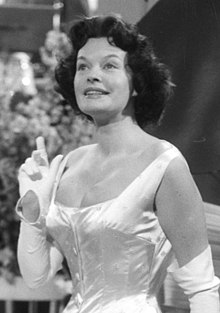music.wikisort.org - Singer
Margot Hielscher (29 September 1919 – 20 August 2017)[1] was a German singer and film actress. She appeared in over fifty films between and 1939 and 1994.
This article may be expanded with text translated from the corresponding article in German. (August 2010) Click [show] for important translation instructions.
|
Margot Hielscher | |
|---|---|
 Hielscher at the Eurovision Song Contest 1958 | |
| Background information | |
| Born | 29 September 1919 Berlin, Germany |
| Died | 20 August 2017 (aged 97) Munich, Germany |
| Occupation(s) | Singer, actress |
Hielscher was born in Berlin. In 1957, she was chosen to represent Germany at the Eurovision Song Contest 1957 with the song "Telefon, Telefon" (Telephone, Telephone). The song finished fourth out of ten, with eight points.
Hielscher was chosen again to represent Germany at the Eurovision Song Contest 1958 with the song "Für Zwei Groschen Musik" (Music For Two Pennies). The song finished seventh out of ten, with 5 points.
In 1989, she starred in the TV series Rivalen der Rennbahn. She died in Munich, aged 97.
Awards
In 1978, Hielscher was awarded the "Bundesverdienstkreuz" and in 1985 the "Filmband in Gold" for her contributions to German cinema.
Selected filmography
- The Heart of the Queen (1940)
- Goodbye, Franziska (1941)
- Love Premiere (1943)
- Women Are No Angels (1943)
- Ghost in the Castle (1947)
- Hallo, Fräulein! (1949)
- The Blue Straw Hat (1949)
- Love on Ice (1950)
- Nights on the Road (1952)
- The Devil Makes Three (1952)
- Homesick for You (1952)
- Hit Parade (1953)
- Jonny Saves Nebrador (1953)
- Salto Mortale (1953)
- It Was Always So Nice With You (1954)
- The Mosquito (1954)
- Murder Party (1961)
- The Blood of the Walsungs (1965)
- Salto Mortale (1969, TV series)
- Die Kette (1977, TV film)
- The Magic Mountain (1982)
See also
- Eurovision Song Contest 1957
- Eurovision Song Contest 1958
- Germany in the Eurovision Song Contest
References
- "Leinwand-Legende Margot Hielscher gestorben". Der Spiegel. 22 August 2017.
External links
![]() Media related to Margot Hielscher at Wikimedia Commons
Media related to Margot Hielscher at Wikimedia Commons
На других языках
[de] Margot Hielscher
Margot Marie Else Hielscher[1] (* 29. September 1919 in Berlin; † 20. August 2017 in München[2]) war eine deutsche Schlagersängerin, Schauspielerin und Kostümbildnerin.- [en] Margot Hielscher
[ru] Хильшер, Марго
Марго Хильшер (нем. Margot Hielscher; 1919—2017) — немецкая актриса и певица .Другой контент может иметь иную лицензию. Перед использованием материалов сайта WikiSort.org внимательно изучите правила лицензирования конкретных элементов наполнения сайта.
WikiSort.org - проект по пересортировке и дополнению контента Википедии